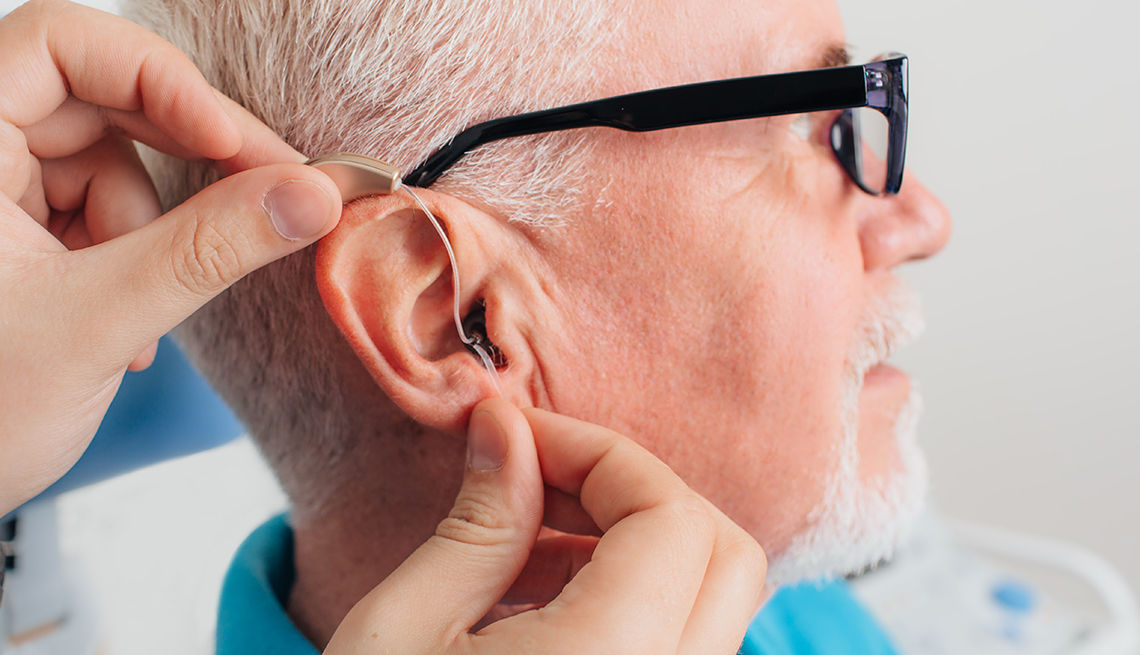
New smart hearing aids go beyond helping you hear
- Select a language for the TTS:
- UK English Female
- UK English Male
- US English Female
- US English Male
- Australian Female
- Australian Male
- Language selected: (auto detect) - EN
Play all audios:

If you haven't upgraded your hearing aids in three to five years, or have been putting off hearing tests because of the stigma of wearing the devices, it may be time to discover
what's new. The technology is more advanced than ever. But even less expensive hearing aids offer sound and speech processing, digital noise and wind noise reduction, plus improved
management of feedback — those annoying high-pitched screeches, squeals and whistles. These features work together to ensure that the sound going into your ears is clearer, not just louder.
"I have participated in studies showing that with all of the latest technologies being incorporated into hearing aids, the less expensive models often work just as well as the most
expensive models. But they have fewer bells and whistles,” says Nicholas S. Reed, an audiologist and assistant professor at Johns Hopkins University Bloomberg School of Public Health in
Baltimore. ENT, AUDIOLOGIST OR HEARING AID DISPENSER? All hearing specialists have to pass state licensing exams to serve patients. The amount of education is generally the difference among
these professionals: • OTOLARYNGOLOGIST. This medical doctor — also known as an ear, nose and throat (ENT) specialist — diagnoses the causes of hearing loss and determines whether hearing
aids are needed. • AUDIOLOGIST. This clinical practitioner assesses and treats hearing and balance disorders, can determine the need for hearing aids and the type best-suited for a patient.
Most have doctorates in audiology (Au.D, although others have a Ph.D., doctor of science (Sc.D.) or master's degree. • HEARING AID DISPENSER/HEARING INSTRUMENT SPECIALIST. Each state
regulates the training needed to become a licensed professional who fits and dispenses hearing aids. Many require an apprenticeship program with an experienced audiologist or hearing aid
dispenser; others may require a two-year degree from an accredited program or even a master's degree in audiology. Most people who have bought the most expensive and cutting-edge
hearing aids never wind up using the extra features and functionality, research shows. "The benefits someone receives from wearing hearing aids is often more of a function of how well
they're fitted to them,” says Abram Bailey, an audiologist and president of Austin, Texas-based HearingTracker.com, a shopping resource for hearing aid consumers. So you don't
necessarily need to purchase the most expensive and technologically advanced equipment. But you do need to work with a skilled audiologist, hearing instrument specialist or hearing aid
dispenser to match the devices to your needs and ears. "The one critical thing I recommend a patient look for is an audiologist who runs real ear verification tests on everyone when
fitting and customizing hearing aids,” Bailey says. “This is a test where a tiny microphone is placed within the ear along with the hearing aid to measure the hearing aid's output” and
what the patient actually hears. Though the insides of people's ears have the same basic shape, little differences can change how sound bounces around before it hits the eardrum. The
size of the ear canal, where the hearing aid's speaker is placed within it and personal preference for louder or softer sounds from the device are among the variations that play a part.
Hearing aids generally last four to seven years, according to manufacturers. Ones that sit within the ear tend to have a lifespan on the shorter end of the scale because they're
exposed to more earwax and even sweat inside the ear canal. But like smartphones and smart TVs, some of the newest hearing aids have features not available even a few years ago. That
doesn't always mean higher prices because the devices take advantage of advances in chips developed for Bluetooth headsets, computers and smartphones. Competition from less expensive
personal sound amplification products (or PSAPs, pronounced PEE-saps), devices that aren't regulated by the FDA like hearing aids, also plays a part. "Whether or not you should pay
extra for a hearing aid with certain functionality should depend on if you plan to use those functions or not,” Reed says. “If a feature is not something you need, you already have on
another device or it's something you know you won't use, look for hearing aids that don't require you to pay extra for those functions."
